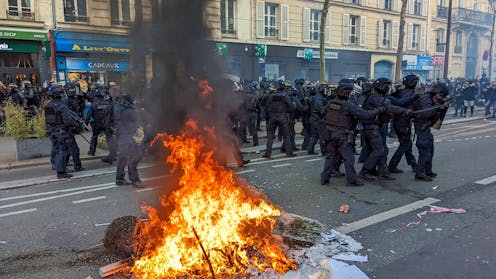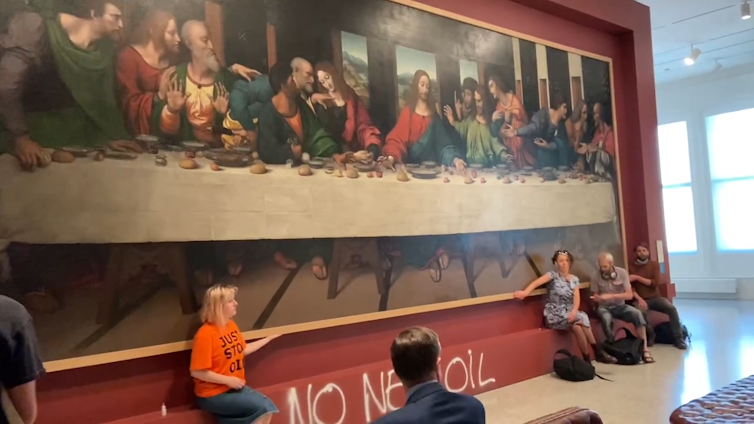Detta inlägg post publicerades ursprungligen på denna sida this site ;
Date:
Author: Mete Sefa Uysal, Lecturer in Social & Political Psychology, University of Exeter
Original article: https://theconversation.com/why-do-protestors-use-disruptive-confrontational-tactics-new-research-shows-theyre-not-just-a-last-resort-256716

Public protests are on the rise globally, from climate marches and university occupations to roadblocks and mass political demonstrations. These actions may sometimes include confrontational tactics such as civil disobedience, disruption and, at times, violent resistance.
At Columbia University in the US, for instance, pro-Palestine student protests recently captured global attention for their tactics. They ranged from non-confrontational actions such as gatherings and sit-ins to campus encampments and occupations aimed at disrupting daily activities, which eventually led to confrontations with police.
Actions like these often spark debate. Are activists acting strategically, or simply reacting out of desperation and rage? Our new research sheds light on this question. Contrary to popular belief, people do not only turn to confrontational protest because they are desperate or lack political alternatives.
Confrontational protests are frequently portrayed negatively. They are often associated with extremism, disorder, or desperation. So it’s long been a mystery why people choose such confrontational forms of protest, especially given more conventional options like petitions or authorised rallies offer broader public support and visibility.
Get your news from actual experts, straight to your inbox. Sign up to our daily newsletter to receive all The Conversation UK’s latest coverage of news and research, from politics and business to the arts and sciences.
In our surveys of 3,833 people across three countries – Germany, Turkey and the UK – we found that people choose confrontational action when they believe it is effective and legitimate for achieving their group’s political goals.
That said, in some protests, confrontational tactics may emerge spontaneously as a self-defence, driven by immediate threats. But it is not simply an emotional outburst or a last resort: it can be a strategic choice.
This challenges a widely discussed idea in social and political psychology called the “nothing-to-lose” hypothesis. According to this view, people are driven to confrontational protest when they see non-confrontational action (such as voting, petitioning, or authorised marches) as ineffective. This is often because they have little political trust or are oppressed. Our studies ultimately tested this hypothesis.
We found that most people rated non-confrontational actions as more effective than confrontational ones. But they still saw confrontational tactics as worthwhile if they also seemed effective and justifiable.
Interestingly, we discovered that low political trust – a lack of belief that the political system works fairly – did not predict confrontational protest. In fact, it was only weakly linked to perceived effectiveness and legitimacy of such tactics.
While previous theories suggested that people with nothing to lose would be the ones most drawn to radical action, our findings paint a more complex picture. People don’t necessarily need to lose all faith in the political system before considering disruptive protest. Rather, they judge whether a specific tactic will advance their cause and align with their collective moral values.

wikipedia, CC BY-SA
We also found that when people think that protests are more likely to be met with state violence, they are more likely to view confrontational tactics as legitimate and effective. In other words, when crowds foresee push-back, they recalibrate their strategies rather than withdrawing altogether from activism.
Constructive disruption
This research matters now more than ever. From climate movement and pro-Palestine rallies in many countries to anti-government and pro-democracy protests in the US, Turkey, Serbia and Argentina, we are witnessing a global wave of protest crowds.
Understanding what drives people to disruptive and confrontational actions can help both policymakers and the public make sense of protest in today’s divided world. This may be a better option than moralising about good versus bad forms of protests, which serves to silence and criminalise disruptive and confrontational actions.
The former UK home secretary Suella Braverman labelled climate protesters “extremists” and pro-Palestinian protests “hate marches”. She also proposed harsher crackdowns. But such an approach is only likely to make the protests more disruptive.
Similarly, several government responses to UK parliamentary reports on protest policing distinguish “right to peaceful protest” from any kind of disruptive and confrontational activism. They also highlight that the legal definition of “serious disruption” has been widened.
But viewing all disruptive protests as being outside of legal boundaries is likely to create pushback among activists and limit the potential constructive social influence of such protests.
We argue that it’s time to rethink how we talk about confrontational and disruptive protests. Rather than viewing them as irrational, extreme or born of despair, we should understand it as part of a wider repertoire of political action.
Here, labelling a set of protests through binary, moralised terms can lead to overlooking and silencing a crucial and effective protest strategy: constructive disruption. Constructive disruption relies on carefully balancing non-violent but disruptive actions. This can apply pressure for change while signalling positive intent that encourages a conciliatory response to protest.
As a group of social psychologists recently showed, constructive disruption could generate support even among those who are most resistant.
If we recognise that such tactics are often grounded in a sense of justice and strategic reasoning, we can move away from moralistic judgements and toward democratic dialogue by better engaging with the underlying demands that drive them.
As protest movements continue to shape political life around the world, we believe it’s time to take their strategies seriously – not just their slogans.
![]()
Mete Sefa Uysal received funding from the International Society of Political Psychology Scholar Under Threat Fund for a part of this study.
John Drury and Yasemin Gülsüm Acar do not work for, consult, own shares in or receive funding from any company or organisation that would benefit from this article, and have disclosed no relevant affiliations beyond their academic appointment.